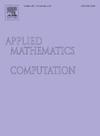Environmental-feedback-driven time-varying reputation update solve social dilemmas
IF 3.4
2区 数学
Q1 MATHEMATICS, APPLIED
引用次数: 0
Abstract
The reputation mechanism serves as a critical component in sustaining the efficient functioning of social systems. Building upon existing research, this study introduces a novel time-varying reputation update rule that incorporates environmental feedback. Specifically, we establish that the reputation reward for cooperation follows a positive yet non-linear relationship with the proportion of cooperators, while the reputation penalty for defection exhibits a negative but equally non-linear correlation with the cooperator ratio. Our research yields two significant contributions: First, our findings reveal two key insights: The proposed mechanism significantly enhances cooperative behavior compared to traditional version, demonstrating superior performance in improving network reciprocity utility, and compared to homogeneous reputation, time-varying reputation update perform better in enhancing cooperation under low social dilemma. Second, we extend this framework by developing three additional time-varying reputation update rules that incorporate environmental feedback. Comparative analysis demonstrates that different reputation mechanisms exhibit varying levels of effectiveness in promoting cooperation under different intensities of social dilemmas. The reward conditions during the initial cooperative evolution will influence the spread of cooperative behavior in future systems. These findings not only deepen our theoretical understanding of reputation dynamics but also provide insights for designing context-specific reputation systems.
环境反馈驱动的时变声誉更新解决了社会困境
声誉机制是维持社会系统有效运作的关键组成部分。在现有研究的基础上,本研究引入了一种新的时变声誉更新规则,该规则包含了环境反馈。具体而言,我们建立了合作的声誉奖励与合作者比例呈正非线性关系,而背叛的声誉惩罚与合作者比例呈负非线性关系。我们的研究有两个重要贡献:一是我们的发现揭示了两个关键的见解:与传统机制相比,所提出的机制显著增强了合作行为,在提高网络互惠效用方面表现优于传统机制;二是与同质声誉相比,时变声誉更新在低社会困境下的合作表现优于同质声誉。其次,我们通过开发三个附加的时变声誉更新规则来扩展这个框架,这些规则包含环境反馈。对比分析表明,在不同的社会困境强度下,不同的声誉机制在促进合作方面表现出不同程度的有效性。初始合作进化过程中的奖励条件将影响未来系统中合作行为的扩散。这些发现不仅加深了我们对声誉动力学的理论理解,而且为设计特定情境的声誉系统提供了见解。
本文章由计算机程序翻译,如有差异,请以英文原文为准。
求助全文
约1分钟内获得全文
求助全文
来源期刊
CiteScore
7.90
自引率
10.00%
发文量
755
审稿时长
36 days
期刊介绍:
Applied Mathematics and Computation addresses work at the interface between applied mathematics, numerical computation, and applications of systems – oriented ideas to the physical, biological, social, and behavioral sciences, and emphasizes papers of a computational nature focusing on new algorithms, their analysis and numerical results.
In addition to presenting research papers, Applied Mathematics and Computation publishes review articles and single–topics issues.

 求助内容:
求助内容: 应助结果提醒方式:
应助结果提醒方式:


